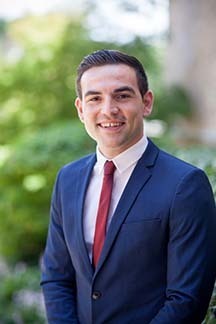
David Hardwicke, who came to ESTEEM from Ireland last year, won the Fast Pitch competition in the Cardinal Challenge at the University of Louisville on Feb. 18. Hardwicke spoke for the Structured Immunity team, advised by Brian Baker, which includes Baker Lab graduate student Tim Riley and second-year MBA student Fan Ping.
Hardwicke had 60 seconds without notes or props to tell five investors and an audience about the problem Structured Immunity addresses, its solution, its business model, how it makes money, and what’s in it for the investor. Judges evaluated passion, completeness, relevance, and style. Eight of the 12 teams at the competition participated in the event while four others, which had won their topical preliminary business plan contests, advanced to a final round.
Structured Immunity is a service-based biotech company that specializes in the optimization and enhancement of the human immune system for cell-based cancer immunotherapy. The company uses a proprietary platform to help pharmaceutical companies improve their cell therapies. By using Structured Immunity’s service, pharmaceutical companies can increase therapy potency and dramatically reduce the risk of side effects, resulting in better patient outcomes. The startup is a collaborative project based on Hardwicke’s capstone thesis and technology founded by Baker and Tim Riley.
“Brian and Tim wanted to commercialize this technology because they thought it could benefit a lot of people,” he says. “Immunotherapy is a rapidly growing form of cancer treatment. We have the technology which can improve it."
It’s exactly what Hardwicke hoped when he joined ESTEEM with a science degree and an interest in cancer research, biotechnology, and entrepreneurship. Since last summer, he has conducted market research, talked to potential customers, developed a business model, made financial projections, and assembled a business plan. The team presented the plan in the first round of the Cardinal Challenge with two other teams in the Biotechnology category. There, they had 15 minutes to describe the project to four judges and 15 minutes to answer questions.
“At Louisville, I learned the importance of having a great team,” Hardwicke says. “From speaking with other teams, people may have encountered difficulty when they were talking to the judges because there wasn’t somebody with technical ability, with financial ability. It’s all based on the team. When you’re dealing with something that’s very technically dense and full of complex science, it is of paramount importance to break down that science and make it easily digestible for people who are not from a technical background.”
Structure Immunity has Riley as Chief Science Officer, Ping as Chief Financial Officer, and Hardwicke as VP of Sales, handling the business model, market research, and customer discovery. “It’s a mix of business, technical, and financial,” he says. “It helps us a lot when we’re in a presentation that we have that kind of diversity.”
The Cardinal Challenge was valuable preparation for the McCloskey Business Competition, Hardwicke says.
“The in-depth feedback we received from the judges helped us to alter our presentation and business plan to make the science behind our technology easier to understand and more appealing to a wider audience,” he says. “The feedback helped us fine-tune our business model even further, making it ultra clear what the problem is, how we solve it and who we solve it for. The Louisville competition also further highlighted our team’s individual strengths, allowing us to focus more on doing what we are best at. It has put us in a much better position both for future business plan competitions and as a company operating in the real world of attracting investment.”
The company is making progress toward commercialization.
“The technology is fully developed,” Hardwicke says. “We’re in the phase of fine-tuning our business model so it’s optimal for our customers. The next stage is to reach out to customers and start selling. We’ve put together a list of people we think would be really interested in our product. We’re helping to start a company. It’s one of the reasons I really enjoy the ESTEEM program. I didn’t know it was going to be as intense as this. I didn’t know I was going to enjoy it as much as I am.”
Hardwicke is also a member of the inaugural Venture Founders Program, an ESTEEM extracurricular launched last year by ESTEEM alum and staff member Dustin Mix and engineering Ph.D. student Maria Gibbs. The initiative introduces students with entrepreneurial passion to important issues that need innovative solutions, such as chronic illness, gaps in employment skill, and the digital divide. Hardwicke and classmate Eoghan Martin are looking at using data analysis to attack the problem of antibiotic resistance.
“From there we begin to develop a solution,” he says. “It all centers on design thinking methodologies where we are talking to the user that is affected by the issue. It has really rounded off my learning at ESTEEM – focus on the customer, identify the problem, validate, find solutions, and always empathize with the person.”
Originally published by at esteem.nd.edu on March 01, 2017.